|
|
|
Sort Order |
|
|
|
Items / Page
|
|
|
|
|
|
|
| Srl | Item |
| 1 |
ID:
110149
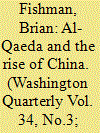

|
|
|
| 2 |
ID:
101928
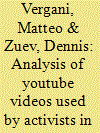

|
|
|
|
|
| Publication |
2011.
|
| Summary/Abstract |
This paper explores the uses of YouTube by Uyghur nationalist movement activists and studies various ideological codes used by different communities to promote their messages. It argues that several ideological codes are produced in order to challenge the dominant ideologies promoted by the Chinese government, which create a ground for Uyghur 'imagined solidarity' across physical borders. Analysis of the production of audio-visual messages by the dispersed ethnic group provides an important window into how ethnic identity is forged by means of Web 2.0.
|
|
|
|
|
|
|
|
|
|
|
|
|
|
|
|
| 3 |
ID:
115818
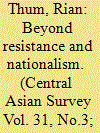

|
|
|
|
|
| Publication |
2012.
|
| Summary/Abstract |
Kashgar's seventeenth-century ruler-saint, Afaq Khoja, is remarkable for the amount of historical writing he has inspired, both outside and within Chinese Turkestan. His reputation among Uyghur historians is one of the few aspects of local Uyghur historical knowledge production that has attracted the attention of foreign scholars. In this essay the author uses the now-familiar example of Afaq Khoja's reputation to show that much of what is distinctive about local Uyghur approaches to history has been so little understood as to be missed even in this often-discussed case. This article describes how the local historical appropriation of Afaq's reputation, particularly the recording of narratives about Afaq in writing, began as a typical product of the Naqshbandi maqamat tradition, was reshaped into Kashgarian local history in the nineteenth and early twentieth centuries, and then reshaped again as an ethno-national history beginning in the 1930s, culminating in the publication of the popular historical novel, Apaq Khoja, and its subsequent burning by officials of the People's Republic of China. While the reputation of Afaq in the present certainly reflects the current political context, it also bears significant marks of these earlier traditions through which it has passed. Thus this article argues for an understanding of 'local history' as a form of knowledge production that embraces a host of historical approaches, including transnational devotional literature, popular local oasis history and nationalist historical fiction. The author also suggests that these transformations of local history have reflected shifting senses of what is 'local' over the last 300 years. The argument is advanced through philological investigation of the manuscript sources, ethnographic fieldwork and literary analysis of the recent novel Apaq Khoja.
|
|
|
|
|
|
|
|
|
|
|
|
|
|
|
|
| 4 |
ID:
192624
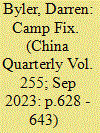

|
|
|
|
|
| Summary/Abstract |
Industrial parks in north-west China occupy a liminal space between labour camps and private industry. Drawing on worker interviews, government documents, industry materials and images this article shows that for-profit public-private industrial parks have been built as part of a “camp fix” mechanism centred on detaining and “re-educating” Uyghurs and Kazakhs at the periphery of the nation. It argues that these industrial parks concentrate forms of repressive assistance and “dormitory labour regimes” that operate at other frontiers of Chinese state power and point these strategies of disempowerment towards a seemingly permanent, ethno-racialized underclass, producing a “re-education labour regime.” It further argues that the material infrastructures of these surveiled and policed spaces themselves are productive in enforcing the goals of the “camp fix”: the creation of high-quality, underpaid, docile and non-religious Muslim workers who are controlled through the built environment.
|
|
|
|
|
|
|
|
|
|
|
|
|
|
|
|
| 5 |
ID:
156108


|
|
|
|
|
| Summary/Abstract |
Persian language manuals uniformly adopt national categories such as Persian/Farsi (Iran), Dari (Afghanistan) and Tajik (Tajikistan). These categories at once impose an imagined contrast between the languages at the high register that is in fact marginal, while occluding profound linguistic variation within these nation-states at colloquial registers. Similar schemas apply to Central Asian Turkic languages such as Uyghur and Uzbek, which are closely related at the formal/literary register, but regionally diverse at lower registers. This dominant instructional approach ill prepares language learners for engaging the region on its own terms, rather than through the lens of nationalist aspirations. Students would be better served by an integrative method that teaches a transnational high language (in the case of Persian) while introducing a diverse range of dialects.
|
|
|
|
|
|
|
|
|
|
|
|
|
|
|
|
| 6 |
ID:
114576
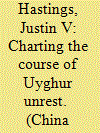

|
|
|
|
|
| Publication |
2012.
|
| Summary/Abstract |
What explains the course of Uyghur-related violence in Xinjiang and Central Asia since 1990? Using data derived from a variety of sources, I argue that the locations and types of violent incidents were influenced by a combination of Chinese government policies and the political geography of Xinjiang. Specifically, 1990 to 1996 were dominated by logistically complex incidents in a low-level violent campaign in Xinjiang. The Strike Hard campaign in 1996 brought about an increase in logistically simple incidents in Xinjiang and some violence in Central Asia as Uyghur separatists had trouble moving people, information and weapons across the well-guarded, difficult terrain of Xinjiang's borders. China's rapprochement with Central Asian countries in the late 1990s led after 2001 to a dramatic decrease in Uyghur-related violence in general, but also signalled the appearance of logistically creative attacks that required little planning or materials. My findings suggest that Uyghur rebels will have a difficult time mounting a large-scale violent campaign as long as China retains even minimal control of Xinjiang.
|
|
|
|
|
|
|
|
|
|
|
|
|
|
|
|
| 7 |
ID:
080059
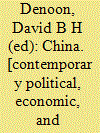

|
|
|
|
|
| Publication |
New York, New York University Press, 2007.
|
| Description |
viii, 245p.pbk
|
| Series |
Current History Books
|
| Standard Number |
9780814720004
|
|
|
|
|
|
|
|
|
|
|
|
Copies: C:1/I:0,R:0,Q:0
Circulation
| Accession# | Call# | Current Location | Status | Policy | Location |
| 052932 | 951.059/DEN 052932 | Main | On Shelf | General | |
|
|
|
|
| 8 |
ID:
096684
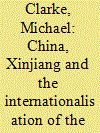

|
|
|
|
|
| Publication |
2010.
|
| Summary/Abstract |
This paper argues that Beiijing's handling of the Xinjiang and Uyghur issues at the domestic, regional and international levels is characterised by a number of contradictions. Domestically, the July 2009 unrest suggests that China's longstanding approach to Xinjiang is at risk of failure due to the contradictions inherent in the logic that underpins Beijing's strategy. Regionally, Beijing faces a contradiction between its growing influence on the governments of Central Asia and the ambivalent attitude of Central Asian publics towards China. Internationally, the major implication of the July unrest has been to signal the internationalisation of the Uyghur issue whereby it has become a significant irritant in Beijing's relations with a number of major Western states, including the USA and Australia. It has been Beijing's own approach to Xinjiang domestically and its handling of the Uyghur issue in its diplomacy that has contributed to the internationalisation of the issue.
|
|
|
|
|
|
|
|
|
|
|
|
|
|
|
|
| 9 |
ID:
163319
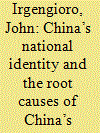

|
|
|
|
|
| Summary/Abstract |
This paper seeks to examine the People’s Republic of China’s (China) self-defined national identity and the consequences on China’s ethnic relations with its ethnic minorities. This paper argues that China’s identity is equated with the identity and culture of its ethnic Han Chinese majority—a narrative originally constructed by the Chinese state which its ethnic Han Chinese majority since indulges in. However, this hegemonic narrative is at the root of interethnic issues and tensions in China today, as further ethnic tensions stem from the resistance of ethnic minorities against Sinicization and the imposition of this “Chinese” identity against them. These phenomena thus both indicate what I term a weak “internal soft power appeal” of Han Chinese Confucian culture for ethnic minorities living in the PRC, and imply that China must adopt a different, more inclusive national identity if it were to maintain ethnic stability in the long term.
|
|
|
|
|
|
|
|
|
|
|
|
|
|
|
|
| 10 |
ID:
155020
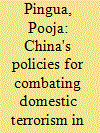

|
|
|
|
|
| Summary/Abstract |
Today, ethnic separatism, religious extremism and terrorism pose a serious challenge to the integrity and unity of China. By upgrading and enhancing the economic status of the Uyghur, Beijing hopes to undermine their demand for an independent homeland. Pooja Pingua analyses China’s policies for combating domestic terrorism in Xinjiang.
|
|
|
|
|
|
|
|
|
|
|
|
|
|
|
|
| 11 |
ID:
104566
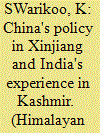

|
|
|
| 12 |
ID:
169227
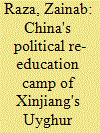

|
|
|
|
|
| Summary/Abstract |
Recently, reports have emerged that China operates “political re-education” camps of Uyghur Muslims in Xinjiang. China justified them as a sort of vocational training program to assist Uyghurs in participating in the Chinese economy. In actuality, they are brutal incarceration camps; these forms of ‘education’ can qualify as torture that perhaps 1.5 million adults have been subjected to, and have led to detaining children of people incarcerated in state-run boarding schools. It is necessary to interrogate the underlying factors that have enabled the Chinese government to open and operate these camps under the guise of education. This paper first examines the impact of the current geopolitical interests of China's Belt & Road Initiative and the historical backgrounds of Xinjiang and the Re-Education through Labour program. It then explains the methods of ‘education’ taking place within the camps and interrogates China's justifications for building them. This education issue is more about inhibiting Uyghur power than China's claim that the camps are meant to empower Uyghurs to participate in the Chinese labour force.
|
|
|
|
|
|
|
|
|
|
|
|
|
|
|
|
| 13 |
ID:
187364
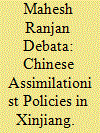

|
|
|
|
|
| Summary/Abstract |
This research article argues that the China’s intention and contention to maintain stronghold in Xinjiang through different policies from time to time reflects the views of Realist theory of international relations, which gives primacy to ‘national interest’ and ‘national security.’ Furthermore, the article argues that the Chinese emphasis on national security and stability in Xinjiang negates the ‘interests and aspirations’ of minority groups in Xinjiang (especially Uyghurs), which form the basis of constructive approach of international relations. While elaborating Chinese policies of assimilation of Uyghurs in Xinjiang from Mao Zedong to Xi Jinping, this article tries to examine how China’s bid to pursuing a kind of hardcore realism in preserving and protecting its interests in Xinjiang (stringent policies) has been contradicting and disregarding the essence of constructivist perspective (aims, and aspirations interests of Uyghurs).
|
|
|
|
|
|
|
|
|
|
|
|
|
|
|
|
| 14 |
ID:
169928
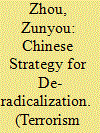

|
|
|
|
|
| Summary/Abstract |
China is fighting a tough battle against separatist terrorism perpetrated by militant Muslim Uyghurs in the far-western region of Xinjiang. De-radicalization is one of the policies the authorities in Xinjiang have recently taken to address the upsurge in terrorist violence. This paper consists of five parts. The first part deals with the background against which the de-radicalization strategy was conceived and developed. The second part discusses several major approaches to the strategy such as “five keys,” “four prongs,” “three contingents,” “two hands,” and “one rule.” The third part presents custodial, post-imprisonment, and social programs for targeting three groups of people: imprisoned radicals, released radicals, as well as those who are radicalized but not prosecuted. The fourth part describes programs for engaging communities in order to win over politically reliable people from civil society for support in de-radicalization. The last part draws a conclusion regarding the characteristics of, effectiveness of, controversies over, and future of the Chinese de-radicalization campaign.
|
|
|
|
|
|
|
|
|
|
|
|
|
|
|
|
| 15 |
ID:
159371
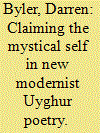

|
|
|
|
|
| Summary/Abstract |
By recuperating the Sufi poetics of the Uyghur past, “avant-garde” Uyghur poets such as Tahir Hamut and Perhat Tursun are claiming a right to speak as heirs to both a religious and a literary tradition. For these modernist poets, finding one’s own way forward through the past is a way of reclaiming the discourse surrounding Uyghur identity, and the cultural symbols built into it, as an extension of the self. By channeling affect in such a way that it appears to derive from conventional Uyghur imagery, these poets demonstrate a measure of self-mastery that restores a feeling of existential security in the midst of political and religious change. This article argues that the purpose of their poems is to force the reader to accept new interpretations of images of Sufi embodiment and spirituality as valid and powerful. It further claims that the new indexing of Sufi imagery in this emerging corpus disrupts the unity of Uyghur poetry in the genres of Chinese Socialist Realism and ethno-nationalist Uyghur tradition, not in a negative process, but in order to create new forms of thought and subjectivity. It forces the reader to interpret the world not by trying to return to mythical Uyghur origins or reaching for a Socialist or an Islamic utopia but instead as a means of self-determination and affirming contemporary life itself.
|
|
|
|
|
|
|
|
|
|
|
|
|
|
|
|
| 16 |
ID:
121436
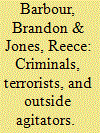

|
|
|
|
|
| Publication |
2013.
|
| Summary/Abstract |
This article is a critical geopolitical analysis of Chinese media representations of the 5 July 2009 riots in Xinjiang, China. Significant events often define the geopolitical climate by creating a space for the construction of boundaries between identity categories and the appropriate norms for behaviour towards the Other. The post-riot reports framed the event through the prism of the global war on terror to justify a violent response to protect Chinese citizens from the perceived threat of the Other. After connecting theories of narratives, the event, and group making, the article identifies three representational tropes - the criminal, the terrorist, and the outside agitator - in Chinese documents that create boundaries between the identity categories Uyghur and Han and define how the Other should be treated. The three representation tropes of the Other in the aftermath of the 5 July riots simultaneously situate the protestors as outside Chinese society and perpetuate the claim of the superiority of Chinese culture and civilisation.
|
|
|
|
|
|
|
|
|
|
|
|
|
|
|
|
| 17 |
ID:
139540
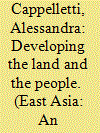

|
|
|
|
|
| Summary/Abstract |
Social development in Xinjiang Uyghur Autonomous Region from 1999 to 2009 is the focus of this article. I will explore the current situation among Uyghurs and Hans living in Xinjiang in different social contexts and purviews, mainly assessing problems and open questions hindering a balanced and consensus-based social development in the area. The concept of “development” per se will be understood with a critical perspective. The fieldwork was conducted in 2011 and 2012 in Urumqi, Turpan, Kahsgar, Wujiaqu and Shihezi, and in eight rural villages—seven located in the Kashgar Prefecture and one in Kizilsu Kyrgyz Autonomous Prefecture. The opportunity to adopt an “insider perspective”, at the same time working with critical tools provided by the disciplines of sociology and anthropology, can be considered an important asset in the field of Xinjiang studies. My PhD research in China (2010–2013) and my work as consultant for KFW (2011–2012) have been of great help in adopting this approach. Interviews, participant observation and analysis of quantitative and qualitative data from different sources are the basis of the fieldwork results presented here. UNDP indicators and indexes are taken as reference in setting and organising data.
|
|
|
|
|
|
|
|
|
|
|
|
|
|
|
|
| 18 |
ID:
173333
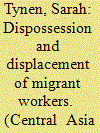

|
|
|
|
|
| Summary/Abstract |
The media often focuses on the visible aspects of state violence. However, the invisible aspects of everyday struggle often go under-reported. How does dispossession and displacement occur for Uyghurs in Xinjiang? What is the role of their dispossession in securing state territorial control? Some Uyghurs from rural areas in Xinjiang, China have experienced a triple dispossession: displacement from the countryside, alienation in the city, and eviction from the city. The stories concern the agony people feel as they move from rural to urban settings and back again, pain caused by severe hardship in the economic, political and cultural senses. This case shows how economic development works together with interventionist state power to violently dispossess and displace the most vulnerable poor minorities from their homes and livelihoods.
|
|
|
|
|
|
|
|
|
|
|
|
|
|
|
|
| 19 |
ID:
103142


|
|
|
|
|
| Publication |
2009.
|
| Summary/Abstract |
This work examines the labour export programme of south-west Xinjiang that brought Uyghur migrant workers to the Early Light Toy Factory in Shaoguan, Guangdong and places it in the context of capitalist-working class divisions emerging in contemporary China, where clashes between managers and workers have become frequent occurrences, and increasing worker solidarity and growing labour activism have become a leading concern of the Communist Party of China and an increasingly influential business class. The author suggests that labour export is primarily utilized not as a means to alleviate poverty and reduce minority-Han income gaps, as claimed by official sources, but as an instrument of business-class interests for dividing and conquering the shop floor through the ethnic diversification of the workforce, an age-old tactic of factory bosses harkening back to the manipulation of foreign-born workers in late-nineteenth-century industrial America.
|
|
|
|
|
|
|
|
|
|
|
|
|
|
|
|
| 20 |
ID:
174892
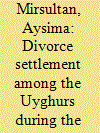

|
|
|
|
|
| Summary/Abstract |
Family law is an important constituent of law that deals with social relations within the family and the household. It regulates conflicts concerning marriage, divorce, child custody, adoption, inheritance and so on. During the Chinese Republican era (1912–1949), as a continuation of the practice in Imperial China, the settlement of conflicts emerging in the Uyghur domestic sphere was governed by Islamic law. In this article, based on several text corpora consisting of legal documents originating in southern Xinjiang (Khotan and Kashgar) from the Republican era, I will analyse the reasons behind such disputes and the final decisions made by Muslim judges. It will also touch upon women’s position in pre-socialist Uyghur society, the role of village elders and fathers-in-law, patterns of dispute settlement, the influence of the different forms of divorce, and the parameters for further research on the texts.
|
|
|
|
|
|
|
|
|
|
|
|
|
|
|
|
|
|
|
|
|